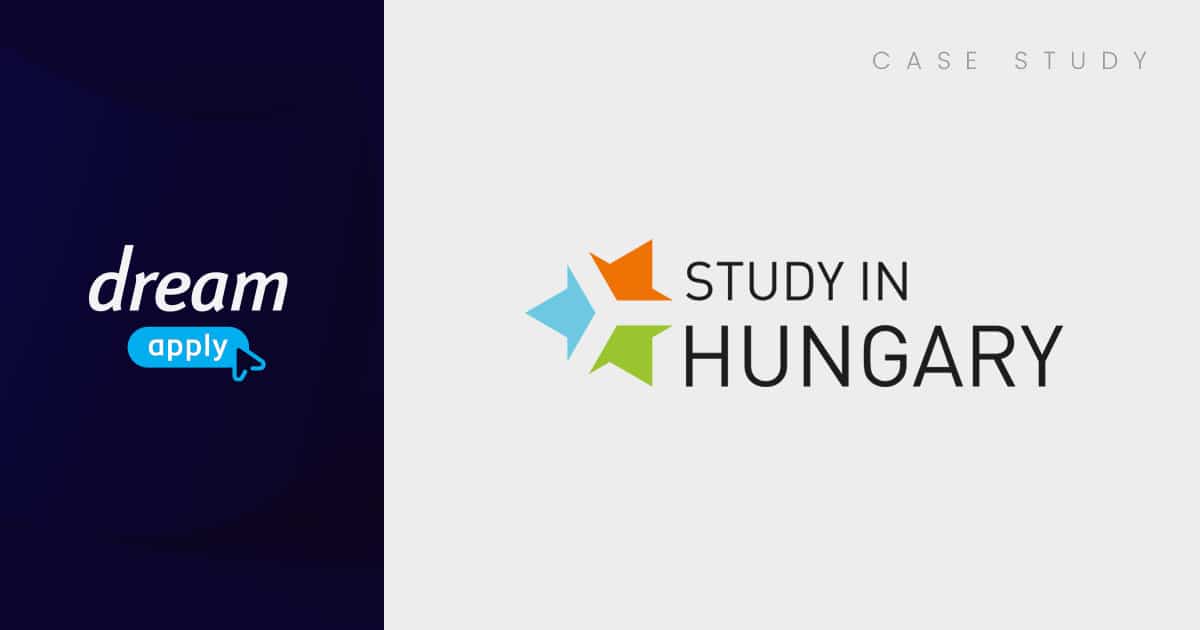Tempus Public Foundation (TPF) is a non-profit organization established in 1996 by the Hungarian Government, managing international cooperation programs and special projects in the field of education (such as the Erasmus+ program on a national level), training, scholarships, and European Union-related issues.
Two of their scholarship programs are managed using the DreamApply software – including the full application and admission process. The larger one is the Stipendium Hungaricum scholarship program, launched by the Hungarian Government in 2013. The program’s core mission is to increase the number of foreign students in Hungary and encourage Hungarian higher education institutions to attract top foreign students. Thousands of students worldwide start their higher education in Hungary each year with the Stipendium Hungaricum program. In 2019, we received more than 28 000 submitted applications, and we expect the number of submitted applications to grow each year.
We asked the Head of Department for Study in Hungary at Tempus Public Foundation, Gábor Dobos, about their experience with DreamApply, and we share the findings related to scholarship management and efficiency here.
How were things done before DreamApply?
Before the DreamApply system, we used a Hungarian-developed application management system. Due to the growing number of submitted applications and the complexity of our application process, the system could no longer respond to our needs. It also proved to be rather complicated for the students and our partners. Besides, it did not provide us enough flexibility to improve the system further to manage other parts of our application process online. As a result, we decided to switch to a system that is much more capable of satisfying our growing needs – including continuous support from the developers with a flexible approach to our requests.
Why did you decide to use DreamApply as your application management system? Did the system fulfill all expectations that were promised by the DreamApply team?
Our previous database system, made by our in-house team, was discontinued, and as our needs became more complex and diverse, we decided to upgrade our entire system with an outside resource. We had to find a new way to handle the Summer School applications and the course applications from the teachers. After reviewing several options, we found DreamApply to be the best solution for us. We’ve been pleased since making the change. It has been delivered upon our needs and wants.
How have the results been with DreamApply?
We are much satisfied with the DreamApply system, which has completely fulfilled our expectations. It is not only the application process that we manage through the system. The whole admission process and the website also serve as an information base with details about, e.g., the universities, study programs, and admission criteria.
They estimate that the efficiency of their staff has increased by 40%. Due to the application history logs, journals, instant reports, statistics, and diagrams, it is super-easy to follow up on what happened and when. In addition, the possibility of sending out email templates in bulk makes the work much less time-consuming.
One proof of how user-friendly the system is to use is that even though the number of submitted applications has doubled since we transferred our Stipendium Hungaricum scholarship program to DreamApply, the number of student inquiries and the workload of our student advisors (customer service) has remained the same.
The system enables them to provide different types of admin rights flexibly. As a result, they can give just the right access to the stakeholders to the data in the system. This is of utmost importance for them as they work with many stakeholders, including partners from almost 70 countries and the staff of 29 Hungarian universities – from administrators to heads of departments.
We also appreciate that the system is flexible, and we can shape it according to our own needs. For example, we can also create, download and share tables with filters and columns of our preference. Customized official documents can also be generated and sent to the students with just a few clicks.
In 2018, Dobos reports that they surveyed the satisfaction of partners, which also included questions about the introduction of the DreamApply system. The results show that 84.4% of the respondents agree that learning how to use and manage the DreamApply online system was easy. The majority of the respondents think that DreamApply is the best solution for the Stipendium Hungaricum Programme. Moreover, with over 500 admin accounts, university staff is also very pleased with the system as it helps them coordinate and conduct the selection and examination process and forward us the results quickly and simply. For example, they can share the application materials with the examiners transparently and even comment on the students’ applications. The application is also simple and fast from the applicants’ side, and they can even self-check due to the task management feature.
The marketing feature of the DreamApply system contributes to our promotional activities. We can track the efficiency of our communication channels used for promotion, such as tracking the influence of our participation at international educational fairs for students or the statistics about the trends of website clicks.
How do you find our Client Happiness team doing alongside the system’s general usability?
We believe that DreamApply is a very easy-to-use system. Help texts support the applicants, and even the admin users are guided by clear instructions embedded in the system and a separate Knowledge Base website maintained by DreamApply. We are also really pleased to work with the Client Happiness team. It is not an exaggeration to say that in some of the busiest periods of the application rounds, we are in touch with the team daily and appreciate that we always receive an instant reply. We are convinced that the team has a flexible and supportive approach, and they are eager to provide help and find the best solutions in all situations. They have also proved to be open to suggestions and new ideas.
To sum up, the DreamApply system is a professional, flexible, and easy-to-use system capable of managing a complex application and admission cycle for tens of thousands of applications a year, including monitoring and following up the entire application process and individual applications. The DreamApply cycle starts when the applicants have just begun to look for information about universities and entry requirements or when we provide “tracking codes” for future applicants at one of our promotional events.
The DreamApply experience then goes through the selection and examination process, followed by the whole notification process. Finally, – at least in our case – it only ends after the students arrive in Hungary, as even their scholarship contracts are generated and sent through the system. The system is quick and continuously improved with new developments and add-on possibilities – and last but not least – it provides us with all tools to fulfill the GDPR requirements and to achieve the maximum level of data safety.
See Tempus Public Foundation live: https://apply.stipendiumhungaricum.hu/
About DreamApply
Founded in 2011 in Estonia, DreamApply is an innovation-driven EdTech organization improving access to education around the globe. DreamApply’s application management software helps more than 300 educational institutions across 40 countries improve admissions, marketing, scholarship management and other internal processes.
DreamApply’s easy-to-use and customizable software increases student enrollment by 30% and reduces application processing time by 40%. With features designed with and for educational institutions, and integrations with commonly used systems, DreamApply empowers teams to get more done with less effort.
Continue exploring by requesting your free, personalized demo.
Subscribe and be the first to receive new case studies, podcast episodes, blog articles and other EdTech resources.

